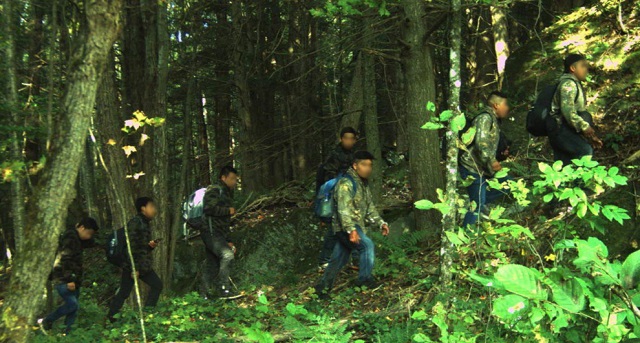Foreign nationals illegally enter the U.S. from Canada through the Swanton Sector
From The Center Square
By Bethany Blankley
Canada officials express alarm about terrorism threats, Americans about impact on US
In addition to members of Congress expressing alarm about national security threats at the U.S.-Canada border, members of the Conservative Party of Canada are blaming Prime Minister Justin Trudeau’s government for being responsible for creating them.
A Canadian House of Commons hearing was held Wednesday to investigate how the Trudeau government granted citizenship to a member of ISIS who allegedly plotted a terrorist attack against Canadians.
An Egyptian father and son were arrested last month for allegedly plotting a terrorist attack in the Toronto area after the father was admitted into Canada in 2018 and granted citizenship in 2024. This was after in 2015 the father allegedly appeared in an ISIS propaganda video, which was shown during the hearing.
Canadian authorities claimed to have thoroughly vetted him before granting him citizenship in May 2024 even though he had aggravated assault charges on his record from 2015 “for the benefit of the Islamic State somewhere outside Canada,” according to the hearing.
Members of the Conservative Party blasted Trudeau and his government, arguing a member of ISIS should not “have been allowed into Canada, let alone granted Canadian citizenship. Canadians deserve to feel safe in their own communities.”
A senior official of the Canada Border Services Agency told MPs that CBSA officers “made the best decisions that we could at that moment in time based on the information we had. Can we do a better job of collectively gathering some of that information? I don’t know. We need to determine that,” CBC reported.
The father and his son, who is not a Canadian citizen, face nine charges, including conspiracy to commit murder for the benefit or at the direction of a terrorist group, ISIS.
The father, Ahmed Fouad Mostafa Eldidi, was granted a visitor visa by the Trudeau government in 2018. He later filed a refugee claim, which was granted. Next, he was granted permanent resident status in 2021 and citizenship in May 2024, according to the hearing.
“This was allowed to happen even though Eldidi is alleged to have appeared dismembering a prisoner in an ISIS video published in 2015,” the Conservative Party of Canada said.
Canadian authorities also claimed the video “wasn’t available to officials who were screening” him, CBC reported. Canada’s Public Safety Minister Dominic LeBlanc said there was “no way” Canadian officials could have known about the video.
The video was reportedly posted on Jihadology.net in June 2015, an American-based website that catalogues ISIS propaganda, according to information from the hearing.
In July, the pair were arrested only after French authorities alerted Canadians about alleged terrorist ties, first reported by Global News.
“If not for that late tip from a foreign government, it’s highly likely many innocent Canadians would be dead today,” the Conservative Party of Canada said. “Justin Trudeau has repeatedly claimed that his government has thorough screening at our borders, he has claimed he takes terrorism and national security seriously, but this foiled terror attack shows that this isn’t the case.”
The hearing was held one month after the Royal Canadian Mounted Police arrested a Canadian woman on terrorism-related offenses. The arrest stemmed “from an ongoing criminal investigation regarding allegations that the individual left Canada and traveled to Syria in 2015 to join ISIS,” the RCMP said in statement.
It was also held after MPs demanded answers about the arrest of a reporter when asking a Canadian minister why the Iranian Islamist Revolutionary Guard Corps hadn’t been designated as a terrorist organization. RCMP security detail reportedly grabbed and arrested the individual; the RCMP officer was reportedly put “under review.”
The reporter “was arrested and accosted on trumped-up charges by the RCMP,” Marilyn Gladu, a Conservative MP, said, adding the Trudeau government “has created a climate where journalists can face criminal charges for demanding answers on critical subjects.”
IRGC is a branch of the Iranian Armed Forces designated by the U.S. government as a foreign terrorist organization.
Members of Congress have called on the Biden administration to strengthen the U.S.-Canada border after the Trudeau government expanded entry to Gazans after the Hamas terrorist attack against Israel, The Center Square reported. The majority of Gazans voted Hamas into power and violent attacks against Jews in America and threats of terrorism have increased. While the Canadian Consul General in New York Tom Clark told The Center Square the Canadian government has “taken every step to ensure the security of Canadians and Americans is in no way jeopardized,” several U.S. and Canadian officials disagree.
Members of Congress have called for stronger security measures after the greatest number of known or suspected terrorists, including an Iranian with terrorist ties, have been apprehended by U.S. officials at the northern border under the Biden and Trudeau administrations since fiscal 2021, The Center Square first reported.
They total nearly 1,100, slightly more than one U.S. Army battalion.
Americans have expressed concerns about why a record number on the U.S. terrorist watch list are in Canada, aren’t being stopped by Canadian authorities prior to attempting to enter the U.S. and question how many more entered the U.S. from Canada who evaded capture.
















